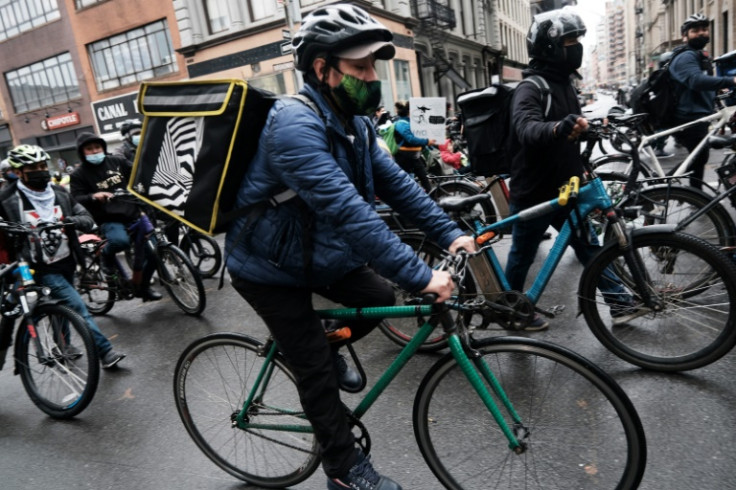
Three big companies in the gig economy -- Uber, Doordash and Grubhub -- lost a court battle Thursday in New York after a judge upheld a new minimum wage for app-based food delivery workers who became essential during the pandemic.
The new law mandating that the platforms pay the couriers more -- at least $18 per hour starting in October -- was supposed to go into effect in July, before the companies sued to obtain a restraining order.
Judge Nicholas Moyne of the State Supreme Court put the new law on hold while he deliberated, but on Thursday he ruled against the plaintiffs and said the legislation could take force.
"In rain, snow, sleet, hail and heat, our delivery workers have consistently delivered for us -- and now we can finally deliver for them," Mayor Eric Adams said as he welcomed the ruling.
"A living wage for thousands of workers in New York City is a huge achievement that will make huge changes for 'deliveristas,'" said Gustavo Ajche, leader of a movement called "Los Deliveristas Unidos."
In New York these workers are often referred to as "deliveristas" since many are immigrants from Latin American countries.
DoorDash called the decision disappointing, saying the mandated wage hike was extreme and would "reduce opportunity and increase costs for all New Yorkers."
Uber, Doordash and Grubhub can file an appeal.
The new minimum wage is supposed to go up to $20 an hour by 2025 for the city's 60,000 app-based food delivery workers.
New York says it is the first city in the United States to take such a step, which comes amid persistent debate about the gig economy and workers who lack the status of full-blown employees of a company -- and the benefits that would come with those positions.
Deliveristas became heros during the Covid-19 pandemic as people relied on them when restaurants, bars and stores closed to curb the spread of disease.
The city released a study in November 2022 that concluded these delivery workers made an average of about $14 an hour at that time if tips were included, but only $7 without tips, from which $3 per hour in non-reimbursed expenses had to be subtracted.



